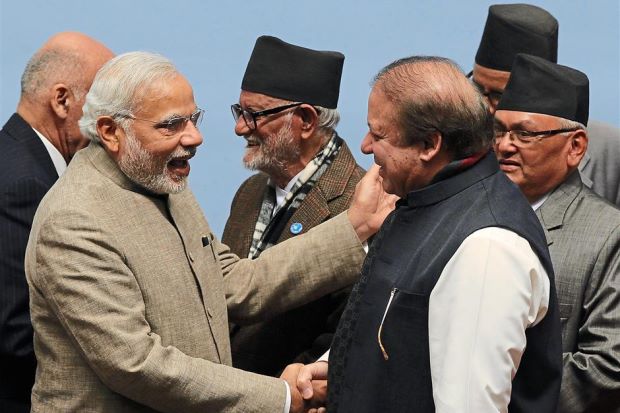Ashish Shukla for BeyondHeadlines
India-Pakistan rivalry dominated the two day SAARC Summit held in Kathmandu on 26-27 November 2014. On the very first day, representatives of the two most important and nuclear-armed nations—Narendra Modi and Nawaz Sharif—did not exchange even pleasantries. Later, citing an incomplete “internal process,” Pakistan objected to three key proposed agreements regarding motor vehicles, rail connectivity and energy cooperation which threatened a complete failure of the summit. However, the next day, in full media glare Modi and Sharif were seen shaking hands, smiling and talking to each other. Pakistan also withdrew its objection to the proposed pacts which led member states to ink the SAARC Framework Agreement on Energy Cooperation. The leaders also promised to sign the other two agreements—the SAARC Motor Vehicles Agreement for the Regulation of Passenger and Cargo Vehicular Traffic, and the SAARC Regional Agreement on Railways—within three months. The Kathmandu Declaration, adopted at the conclusion of the summit, called for deepening regional integration for peace and prosperity in the region by intensifying cooperation in trade, investment, finance, energy, security, connectivity and culture.
The last minute attempts definitely averted the complete failure of the Kathmandu summit but India and Pakistan failed to utilise the opportunity to resume the dialogue process. The official dialogue process between India and Pakistan was stalled in August 2014 due to the cancellation of Foreign Secretary level talks by the Indian government following Pakistan’s High Commissioner Abdul Basit’s meeting with Kashmiri separatist leaders. The situation became more complicated with the repeated violation of 2003 ceasefire by both the countries. Both the countries accuse each other for escalating tensions at the border yet refuse to get engaged to resolve the issue. If you don’t talk to each other then only option to resolve the issue is to go for war. And one knows the cost of two de-facto nuclear powers fighting each other.
India’s present position, as described by External Affairs Ministry spokesperson Syed Akbaruddin, is that the government is interested in “meaningful dialogue” with Pakistan. Pakistan for its part says that it is India’s responsibility to initiate the dialogue. Nawaz Sharif himself stated recently that since the cancellation of talks was New Delhi’s unilateral decision, the ball is now in India’s court.
Resuming the dialogue process is undoubtedly the responsibility of the leaders of both the countries. However, one of the two needs to walk an extra mile to make this happen, as dialogue is the most effective and efficient way to resolve all the differences and move forward. Why the two leaders are hesitant to go ahead on the dialogue path? To answer this very pertinent question, a careful analysis of the internal situation in both the counties is required. As far as Pakistan is concerned, the internal political situation is not very stable but shaky. The duo—Pakistan Tehrik-e-Insaf (PTI) chairman Imran Khan and Pakistan AwamiTehreek (PAT) patron-in-chief Dr. Tahir-ul-Qadri—has given Nawaz Sharif a tough time over the allegation of rigging in the election and weakened his position politically. A politically weakened Nawaz Sharif, because of the sit-in in Islamabad and nationwide protests by PTI and PAT, is not in a position to come forward and take the initiative.
Contrary to Nawaz Sharif’s position, Narendra Modi is politically secure till the next general elections in 2019. Opposition parties in the parliament are neither in a position to create any hurdle, as far as resuming talks with Pakistan is concerned, nor willing to object any such initiative. Thus, Modi is in a position to walk an extra mile if he has the political will to do so. Some observers suggest that Modi has fundamentally changed India’s Pakistan policy and talks would only happen when Pakistan addresses Indian concerns—punishing the perpetrators of Mumbai attack, and stopping using proxies to create trouble in India. There are others who believe that India’s tough stand on Pakistan is continuing because BJP is eying on the assembly elections in the State of Jammu and Kashmir. There is an element of truth in the argument, as BJP has had whipped anti-Pakistan sentiments for political and electoral gains.
Whatever the case, the buck stops at Prime Minister Modi’s desk. It is he who has to be blamed for ignoring the long term national interest for the short term gains. India should not have cancelled the foreign secretary level talks just because Pakistani officials met the Kashmiri separatists. And this was not for the first time that Pakistani officials met the separatists before talking to India.
Not talking is not an option especially with your neighbour, as it deepens mistrust and strengthens the hands of hawks on both the sides. Thus, the conventional wisdom and logic demands that India, which is being seen stalling the dialogue, should immediately take steps to put the dialogue process on the track.
(Author is Ph.D. Candidate, South Asian Studies, School of International Studies in JNU, New Delhi.)






















